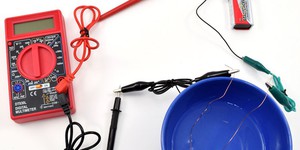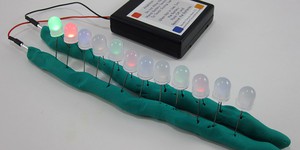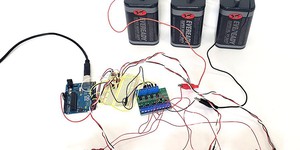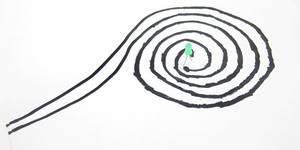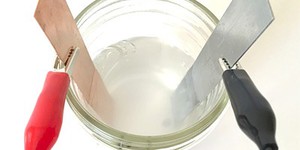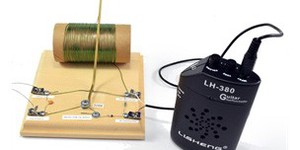Others Like “Which Materials are the Best Conductors?” (top 20 results)
|
You may be familiar with permanent magnets—the kind that hang on a refrigerator. But did you know that other magnets, called electromagnets, can be turned on and off? When turned on, electromagnets act just like permanent magnets, but if you turn them off, their magnetic properties disappear. Electromagnets are an important part of many electronic devices, like motors, loudspeakers, and hard drives. You can create an electromagnet with a simple coil of wire and a battery. In this project,…
Read more
The makers of sports drinks spend tens to hundreds of millions of dollars advertising their products each year. Among the benefits often featured in these ads are the beverages' high level of electrolytes, which your body loses as you sweat. In this science project, you will compare the amount of electrolytes in a sports drink with those in orange juice to find out which has more electrolytes to replenish the ones you lose as you work out or play sports. When you are finished, you might even…
Read more
Have you tried our first electric play dough project,
and now you are looking for more to do? Do you want to learn more about circuits and add even more lights? Check out this project for part 2 of our play dough circuits series!
Read more
An electric current produces a magnetic field. You can take advantage of this fact to make a simple apparatus to test the electrical conductivity of various materials, including both solids and liquids. The detector consists of a coil of wire, with a magnetic compass inside it. You connect one end of the coil to a D-cell battery. The other end of the coil is connected to whatever material you are testing, and the material, in turn, is connected to the other end of the D-cell. In other…
Read more
Maybe somewhere in your home there's a long hallway or a stairway with a light that you can turn on from either end. It's a nice convenience, but did you ever wonder how it's wired up to work that way? The goal of this project is to build a similar circuit with switches, flashlight batteries and a flashlight bulb (obviously, household circuits are not safe to experiment with). You'll need to understand the difference between connections made in series and connections made in parallel in an…
Read more
A mass driver uses electromagnetics to launch projectiles. In the future, such a device could launch payloads into space without the use of chemical rockets. This could lead to long-term cost savings when launching large amounts of material into space—for example, to construct a space station. In this project you will design and build your own working model mass driver as you learn some of the engineering principles behind how mass drivers operate.
Read more
Electric paint is a fun way to include a circuit with lights in an art project, but it presents a challenge not found in traditional electronic circuits. What happens if you change the length or width of your strokes of paint, such as by painting longer, curvier lines or using a thicker brush? Could this affect the electrical properties of your circuit? Try this project to find out!
Read more
Solar cells are an alternative method for generating electricity directly from sunlight. With this project, you can get down to the atomic level and learn about the world of solid-state electronics as you investigate how solar cells work. Your experiment will measure the effect of changing light intensity on power output from the solar cell. A possible variation would be to investigate the effect of changing the color of the light.
Read more
Have you ever wondered how your cell phone or laptop keeps running once you unplug it? Sure, it is the battery that makes your portable electronics work, but how exactly does a battery do that, and from where does the electricity come? Generally, in a battery chemical energy is converted into electrical energy. In fact, many different types of batteries exist that are all based on a different set of chemical reactions. In this science project, you will explore a special battery variant called…
Read more
Have you ever wondered how a radio can grab signals that are transmitted through the air and convert them into sound? In this science project, you will build your own AM radio receiver from scratch and use it to listen to AM radio broadcasts. With your crystal radio you will be able to experiment with the circuit and the antenna to get the best reception.
Read more
|
Explore Our Science Videos
Build A Vortex Cannon!
Storm Surge Activity - Protect Houses From Waves
Rubber Band Paddle Boat with Cardboard and Duct Tape




